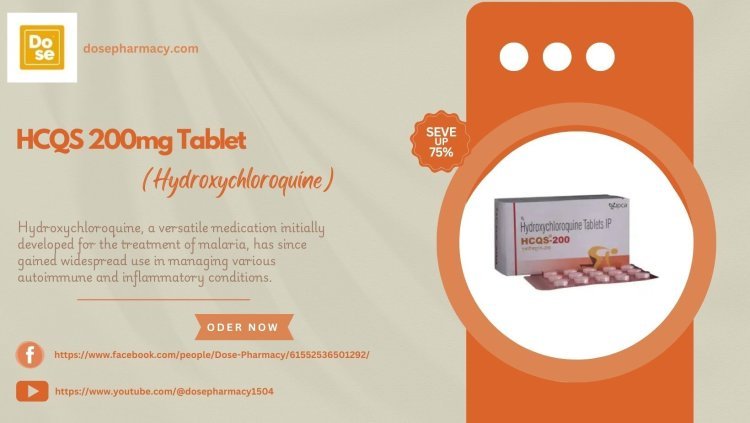The Role of Hydroxychloroquine in Malaria Treatment
Hydroxychloroquine has been used to treat malaria by inhibiting parasite growth, but its effectiveness has declined due to resistance.

Introduction
Malaria is a life-threatening disease caused by Plasmodium parasites, transmitted through the bite of infected female Anopheles mosquitoes. Over the years, several medications have been used to combat malaria, with hydroxychloroquine emerging as one of the key drugs in its treatment. Buy Hydroxychloroquine Online from dose pharmacy, initially developed as an antimalarial drug, has found multiple applications in the medical field. However, its effectiveness against malaria remains a subject of scientific discussion due to the emergence of drug resistance. This article explores the role of hydroxychloroquine in malaria treatment, its mechanism of action, benefits, limitations, and alternative treatments.
Understanding Hydroxychloroquine
Hydroxychloroquine is a derivative of chloroquine, a well-known antimalarial drug that has been in use since World War II. It belongs to the class of 4-aminoquinolines, which are known for their ability to inhibit the growth of Plasmodium parasites in human blood. Although primarily used for malaria, hydroxychloroquine has gained prominence in treating autoimmune diseases like lupus and rheumatoid arthritis.
How Hydroxychloroquine Works Against Malaria
Hydroxychloroquine exerts its antimalarial effects by interfering with the parasite's ability to digest hemoglobin within the red blood cells. When Plasmodium parasites invade red blood cells, they consume hemoglobin as a nutrient source. During this process, toxic heme by-products are released. Hydroxychloroquine prevents the parasite from neutralizing these toxins, leading to its death. This mechanism makes hydroxychloroquine effective in treating uncomplicated malaria caused by Plasmodium vivax, Plasmodium ovale, and Plasmodium malariae.
Effectiveness in Malaria Treatment
Historically, hydroxychloroquine was widely used in malaria-endemic regions as a first-line treatment. However, over time, the widespread use of the drug led to the development of resistance, particularly in Plasmodium falciparum, the most dangerous malaria-causing parasite. This resistance emerged due to genetic mutations in the parasite that enabled it to expel the drug before it could exert its toxic effects. As a result, hydroxychloroquine is no longer recommended for treating Plasmodium falciparum malaria in many parts of the world.
Despite this, hydroxychloroquine remains effective in certain cases:
-
Treatment of Non-Resistant Malaria: In areas where resistance has not developed, hydroxychloroquine can still be used for treating uncomplicated malaria.
-
Prevention of Malaria: In some cases, hydroxychloroquine is prescribed as a prophylactic drug for travelers visiting malaria-endemic regions, especially in areas where resistance is not prevalent.
-
Combination Therapy: While not a first-line drug, hydroxychloroquine is sometimes used in combination with other antimalarial drugs to enhance effectiveness.
Limitations and Challenges
1. Drug Resistance
The primary challenge in using hydroxychloroquine for malaria treatment is drug resistance. In the 1950s and 1960s, chloroquine and its derivatives were widely used, leading to widespread resistance in Plasmodium falciparum, particularly in Africa and Southeast Asia. This forced health organizations to shift towards more effective alternatives like artemisinin-based combination therapies (ACTs).
2. Side Effects
Hydroxychloroquine is generally well-tolerated but can cause side effects such as:
-
Nausea and vomiting
-
Dizziness
-
Skin rashes
-
Vision problems with prolonged use
-
Cardiac toxicity (rare but serious)
3. Reduced Availability
Due to its increased demand for treating autoimmune diseases, hydroxychloroquine’s availability for malaria treatment has declined in some regions.
Alternatives to Hydroxychloroquine for Malaria
Given the resistance issues associated with hydroxychloroquine, several alternative treatments have become the preferred choice for malaria management:
1. Artemisinin-Based Combination Therapies (ACTs)
ACTs are the current gold standard for treating Plasmodium falciparum malaria. These combinations include drugs like artemether-lumefantrine and artesunate-mefloquine, which work effectively to clear the parasite from the bloodstream.
2. Mefloquine
Mefloquine is another antimalarial drug often used for prophylaxis and treatment, particularly in regions where chloroquine resistance is prevalent.
3. Primaquine
Primaquine is highly effective against Plasmodium vivax and Plasmodium ovale, preventing relapse by eliminating dormant liver-stage parasites.
4. Quinine and Its Derivatives
Quinine was historically the primary treatment for malaria and is still used in severe cases when ACTs are not available.
Future Perspectives on Malaria Treatment
The fight against malaria continues with ongoing research and drug development. Scientists are exploring new antimalarial compounds, improved combination therapies, and potential vaccines to combat drug-resistant strains. The RTS,S/AS01 malaria vaccine, recently introduced in Africa, marks a significant milestone in malaria prevention.
Moreover, efforts to develop newer quinoline-based drugs with improved efficacy and fewer side effects are underway. These advancements may pave the way for hydroxychloroquine-like compounds that could play a role in future malaria treatment strategies.
Hydroxychloroquine once played a crucial role in malaria treatment but has largely been replaced due to the development of resistance. While it still has some applications in non-resistant malaria cases and prophylaxis, it is no longer the preferred treatment. With the rise of artemisinin-based therapies and other alternatives, the focus has shifted towards more effective solutions to combat malaria. However, research into new drugs and combination treatments continues, ensuring that malaria remains a treatable and preventable disease. For individuals traveling to malaria-endemic regions, consulting a healthcare provider about the most effective preventive measures is essential.
What's Your Reaction?













